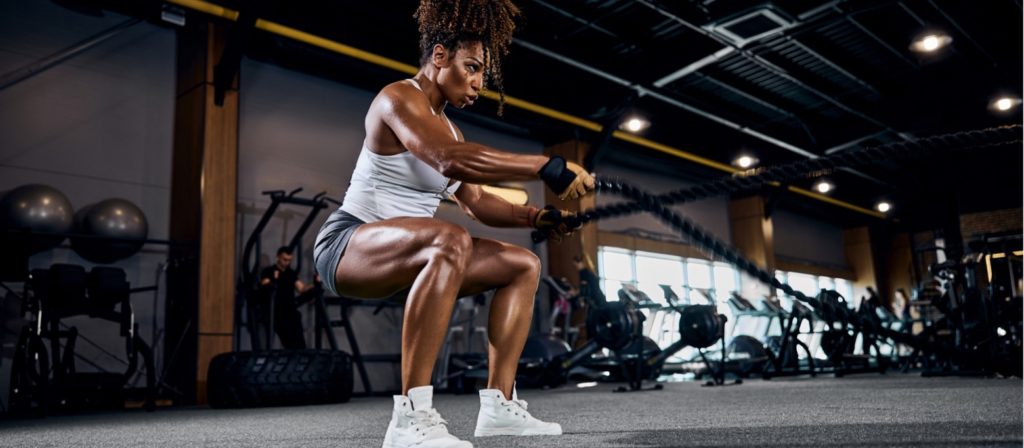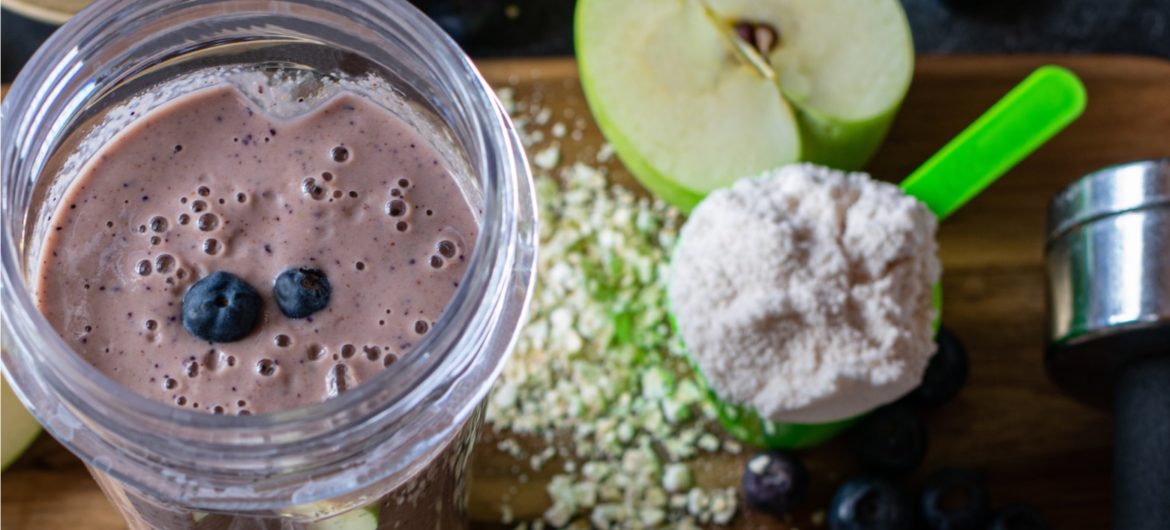As a dedicated competitor looking to push yourself further and harder, you’re probably constantly on the lookout for personalized supplements that boost performance. Indeed, many of the world’s most decorated athletes leverage supplements to help them run faster, lift harder and gain an edge over the competition.
Why do elite athletes love supplements so much? It’s simple. Supplements are an easy way to enhance your diet without adding unnecessary calories and fat. Sure, in theory you could reach your goal of .8 grams of protein per pound of body weight per day by eating steak and eggs at every meal, but that would require you to consume cholesterol, fat, and sodium along with it. On the other hand, drinking a lean protein shake between meals will help you get the optimal amount without the extra stuff. It also requires significantly less prep and cooking.
While protein supplementation is one of the most common dietary enhancements for athletes, especially those looking to gain muscle, there are so many additional nutrients that will help you reach your goals and advance during training and competition. While you can indeed get some of these nutrients through the foods you eat, many of them are not naturally produced in high quantities in the body or are lost in your sweat. Supplementing with shakes, pills, and water enhancements can help.
Shop Science-Backed Personalized Supplements!
One Supplement Does Not Fit All
As tempting as it may be to add a protein shake to your diet and call it a day, the reality is that there is not a single supplement program for all athletes. On the contrary, in fact! Every athlete has their own goals, their own challenges and their own body type, so choosing the right options will vary widely from one to the next. The key is to pick options that help you reach your specific goals based on your specific sport and the skills it takes to succeed in competition.
With that said, there are a few tried and true supplements that many athletes can use to enhance their performance on a day-to-day basis. Below, we’ve outlined some of the best supplements for athletes depending on their goals. Once you determine which ones are right for you, consider investing in a personal pill pack system to ensure that you get the exact nutrients your body needs each day.
Muscle Recovery and Building
Muscle building supplements are a must for athletes who compete in strength-focused contests or want to gain mass — competitive weightlifters, wrestlers, boxers, football players, hockey players, rowers, gymnasts, and beyond. If gaining and sustaining dense muscle mass will help you advance in your sport, you’ll want to consider the following supplements for muscle recovery and growth:
- Protein — When gaining lean muscle mass is your goal, you need protein to do it. A high protein intake equips the body with the amino acids it requires to develop and repair muscle mass. Taking a lean protein supplement, such as a protein powder, can help you make gains and can also help your body repair faster after a hard-hitting lifting session.
- Creatine — Creatine is a naturally occurring amino acid found in the muscles and brain. Although you will get some creatine through your diet, especially if you eat plenty of seafood and red meat, supplementation can help keep the body at optimal levels to help you gain mass. Research shows that creatine supplementation positively impacts strength, power, and speed. It may also help increase lean muscle mass and shorten muscle recovery time.
- BCAA — Branched chain amino acids (BCAAs) are the three essential amino acids — leucine, valine, and isoleucine — required to build protein. These amino acids stimulate muscle growth after exercise and allow your body to build muscle. Additionally, BCAAs can help reduce temporary muscle soreness, which will help ensure that you get back to the gym fast.
- MCT — Medium-chain triglycerides (MCT) are found in oil and powder supplements that can aid in exercise and diet. They are believed to increase the production of ketones, which can serve as an energy source for the brain and muscles when it doesn’t have carbohydrates to use as fuel. For athletes, MCT is especially valuable because it may reduce lactate buildup and make exercise more efficient.
- Potassium — You’ve probably heard that you should eat a banana before or after a workout if you want to feel less sore the next day. That is because bananas are packed with potassium, which can help boost muscle recovery. Bananas aren’t the only way to get your potassium, though. You can also get them through leafy greens, beans, lentils, avocados, squash, broccoli, and of course, supplements.

Performance and Energy Enhancement
Every athlete wants to find a way to improve their performance on the field, court or mat. Performance-enhancing supplements are those that help you push yourself to go the extra mile with ease and to do so with more efficiency, agility, strength, speed, and endurance than your fellow competitors. While your specific enhancement goals are unique depending on your sport, the following supplement options can help you feel tougher and more energetic during matches.
- Energy supplements — Any athlete facing a grueling training regimen knows that taking energy supplements can help make staying on track a bit easier. The reality is that no athlete has a full energy reserve at all times, and rigorous practice can drain it quickly. However, certain vitamins and nutrients can help boost energy levels, so you feel your best as you conquer those tough workouts each day. Adaptogens, vitamin B, iron, magnesium CoQ10 and others can help promote healthy energy levels.
- Electrolytes — Electrolytes are the essential minerals that help our bodies operate at their best. Sodium, chloride, magnesium, calcium, potassium, and others help keep your body’s fluid levels in balance, facilitate muscle contractions, regulate pH levels, and transmit signals from the nerves to the vital organs and cells. When you’re low on electrolytes, you may experience side effects that will hold you back from performing at your best, such as headache, confusion, weakness, loss of muscle control, and lethargy. Since we lose electrolytes through our sweat when we exercise, electrolyte imbalance is especially common among athletes. Adding electrolyte powder to your water before a workout is a great way to replenish your reserves.
- B Vitamins — B vitamins, including vitamin B-12, vitamin B-6, folate, niacin, and others, play a critical role in the body and can help athletes achieve their best. These vitamins aid in everything from the production and synthesis of new cells to the body’s metabolism. What’s more, these vitamins help convert food into energy and synthesize the repair of muscles damaged during exercise, so they can help you push yourself harder in the gym or during competition.
Bone and Joint Health
Any athlete who has to push themselves to work at top speeds or who engages in repetitive motions regularly will want to take bone and joint supplements. These added nutrients are the building blocks from which the bones and joints are made. They can help support the body during stress, age-related changes, and injury. These are essential for endurance competitors, especially runners, tennis players, basketball players, cyclers, and any participant in sports with a high risk for bone and joint injury.
- Calcium — Calcium is an essential mineral employed by the body for the production and maintenance of bones. Although it’s the most abundant mineral in the body, calcium diminishes with age. That’s why it’s so important for older athletes to supplement their calcium.
- Phosphate — Another abundant mineral within the body, phosphorus is important to a variety of anatomical processes occurring in the bones, kidneys and intestines. It is critical to helping the body develop and maintain strong, healthy bones and teeth. When taken as a supplement, phosphorus is often referred to as “phosphate.”
- Collagen — Like calcium, our natural supply of the protein collagen diminishes with age. Because it helps the body develop cartilage — the material that absorbs shock between the joints — it is critical to keeping you agile and pain-free as you age. It is also essential for athletes who regularly put stress and repetitive strain on their joints and may experience a natural loss of collagen, which leads to pain and stiffness and inhibits athletic performance.
- Fish Oil — Fish oil is composed of the omega-3 fatty acids that are critical to overall health and wellness. The fatty acids eicosapentaenoic acid (EPA) and docosahexaenoic acid (DHA) in fish oil supplements are especially beneficial to athletes because they support cardiovascular health and enhance the joints and connective tissues. There are a few added benefits of taking a fish oil pill each morning, including support for the brain, skin, and immune system.
- MCHC — Microcrystalline hydroxyapatite concentrate (MCHC) is a highly absorbable crystalline compound made with the same naturally occurring components that comprise bones, making them ideal for boosting strength and density. A high-quality MCHC supplement will contain bone health essentials such as calcium, phosphorus, and other minerals as well as bone growth factors, collagen, and bone protein for enhanced bone support.
- Vitamin D — Vitamin D is also critical to bone health because it helps the body absorb the minerals required to build and maintain bones, including calcium and phosphorus. Nearly half the population has a vitamin D deficiency, so make sure to counteract your risk with supplementation.

Body Function
In addition to goal- and body-specific supplements, many athletes can benefit from taking general body function supplements that help support heart health, immune system, digestive system, and mind. The following supplements can help athletes of all varieties feel their best during practice and competition.
- CoQ10 — Coenzyme Q10 (CoQ10) provides naturally occurring antioxidants that equip the body with the tools it needs to protect the cells, organs, and tissues from damage caused by free radicals and stress. A CoQ10 supplement can provide full-body support to the neurological and cardiovascular systems and can enhance cellular energy production to help you feel your best.
- Magnesium — An essential part of many high-quality heart health supplements, magnesium supports cardiovascular health and equips the body with the tools it needs to maintain healthy blood pressure levels. Magnesium helps the heart by regulating nerve signals and muscle contractions in the heart. When you don’t have enough of it, you may experience arrhythmias (irregular heartbeat) and other cardiovascular concerns.
- Multivitamins — It’s often a good idea to supplement your diet with a high-quality multivitamin to ensure that you have the vitamins, minerals, and nutrients required to help you function at your best all day long, from rigorous training sessions to getting a good night’s sleep. The best part is, many of the above nutrients can be found in your multivitamin, so you may not have to worry about taking a dozen pills each morning.
Don’t Forget About Hormones
As you likely already know, your hormones play a big part in your athletic performance. Because of this, many people take supplements that help balance or produce hormones, such as progesterone, thyroid, DHEA, cortisol, and others. If you think you may have a hormone imbalance, consider doing at-home hormone testing to get insight into your body’s natural hormone production.
Learn More About At-Home Hormone Testing
Supplementation is Key, But There’s No Magic Pill
Whether you’re a decorated athlete or a new competitor looking to reach the next level, optimizing your diet with supplements may be a game-changer. However, it’s important to remember that there’s no single magic pill or one-size-fits-all approach to supplementation for athletes. Choosing the right combination of supplements and the right formulas from a high-quality supplier such as BodyLogicMD may help. Many of the above nutrients can be found in specialized formulas to help you get your recommended daily dose from a couple of pills or powders.
